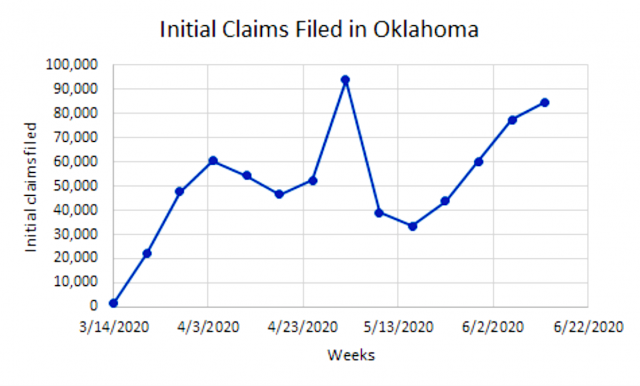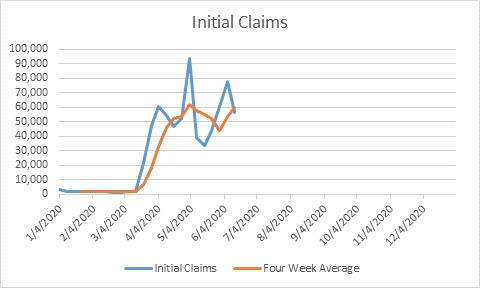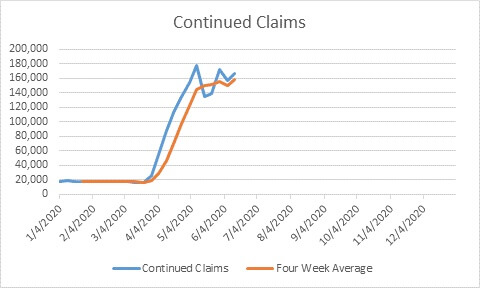

For hundreds of thousands of Oklahomans, applying for unemployment benefits after losing their jobs due to COVID-19 has meant being trapped in a nightmare of crashing web pages, hours-long hold times and promised call backs that never arrive.
That may not end soon, as Oklahomans are still filing more initial and continuing claims than the Oklahoma Employment Security Commission can process.
This story was reported by Gaylord News, a Washington reporting project of the Gaylord College of Journalism and Mass Communication at the University of Oklahoma.
More than 258,000 Oklahomans filed initial and continuing unemployment claims from June 6 to June 13. But the employment commission only processed approximately 177,000 claims during the comparable seven-day period, June 10 to June 17.
“When I call, I’m on hold for hours. Nobody ever picks up,” certified nursing assistant Yolanda Kees said. “Rent, bills, car payment — I’m behind on everything.”
After making an initial unemployment claim, a claimant must continue to file each week they are without employment. But many have filed claims for multiple weeks without receiving benefits, causing several weeks of back pay to add up.
The employment commission said it increased the number of claims processed each week, but many claimants still haven’t seen any sign of their benefits or the $600 additional per month promised by Congress.
“Despite these promising numbers, I see the line in front of our Will Rogers Building every day,” said Shelley Zumwalt, interim director of the Oklahoma Employment Security Commission. “We are working tirelessly to create solutions to help Oklahomans get the help they need.”
‘So many applications’

The agency has been struggling to catch up with the nearly 675,000 initial unemployment claims filed since March 24 when Oklahoma Gov. Kevin Stitt declared a state of emergency. On Thursday, the U.S. Department of Labor reported 84,779 new claims were filed the week ending June 13.
“So many applications versus people to work them,” said Steven Harpe, the director of Office of Management and Enterprise Services, summarizing one of employment commission’s greatest challenges.
Harpe’s office stepped in to help after the former commission executive director Robin Roberson sought assistance to deal with the deluge. Roberson resigned on May 22, after less than four months on the job.
Zumwalt, who previously served as chief innovation officer for Harpe’s office, was named the employment commission’s interim executive director five days later.
Harpe’s agency, which took over the employment commission’s technology systems the day Roberson resigned, built a new and more user friendly website that went on-line on Thursday. The original site, which used a mainframe from the 1970s, had a tendency to crash.
“The technology lift is significant for this agency,” Zumwalt said.
Although the increase in people staffing phones allowed calls from claimants to be answered more quickly, only a fraction of the people answering calls were employment commission employees skilled enough to process claims.
“The institutional knowledge that employees at OESC have, it’s pretty invaluable,” Zumwalt said referring to the employment commission staffers. “We have some very skilled employees that are in high demand right now.”
As a result, throughout May when claimants called, many were told their claim issues were being escalated to “tier two” personnel who would call them back and offer assistance. Often, those calls were not returned for several months, if at all.
“I lost my job April 17, and I called every Monday and Friday,” former Midfirst Bank employee Billy Stephenson said. “They told me I needed to talk to a ‘tier two’ person. Eight weeks later, I’m still waiting for the call.”
Zumwalt abandoned Roberson’s tier system and instead adopted a new strategy to get claimants immediate help.
“First-call resolution is our big push right now, so that people aren’t put into that cycle of, ‘Someone will call you back,’” Zumwalt said.
Solving problems taking time

To achieve more resolutions on each claimant’s first call, Zumwalt placed more employees with substantial claim processing skills on call center shifts.
But she said those calls tend to take longer, increasing the hold times for claimants.
In the month of April, prior to the first-call resolution approach, $413,448,922 in claims were processed. But within the first half of June, approximately $429,000,000 were made in payouts.
“We’re solving more problems,” Zumwalt said. “The sacrifices you make are sometimes people are on hold longer.”
Although a number of challenges facing the employment security commission have been addressed and well over $1 billion have been paid out in benefits, Harpe said as each problem is solved, a new one presents itself.
“It’s very much like you’re in the middle of a war,” Harpe said. “While you’re in the middle of it, you keep getting grenades or rockets launched into your compound, which causes you to continue to scramble.”
Because filing for unemployment includes multiple steps, claimants can run into problems at any point in the process, from their initial claim being rejected to the debit card containing their benefits never arriving.
“I’ve been waiting so long for my debit card,” Kees said. “ It’s frustrating knowing that you have money — because I’ve been approved — but I can’t do anything without the debit card.”
(Editor’s note: OESC commissioner Jim Quillen also serves on the board of the Sustainable Journalism Foundation, which oversees NonDoc. He was not contacted regarding this article, which was produced by Gaylord News.)





















